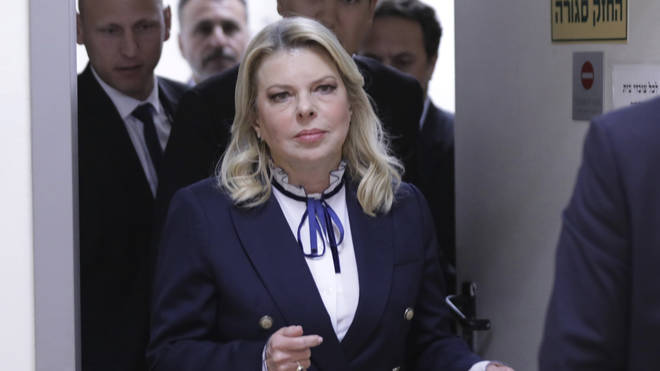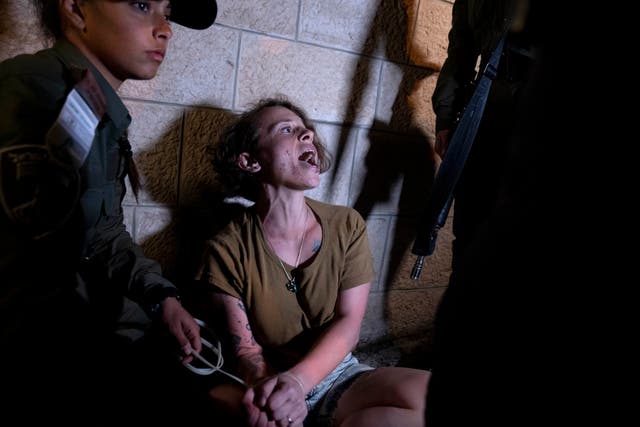Netanyahu denounces ‘anarchists’ after protest outside wife’s hair salon
2 March 2023, 10:24

Demonstrators outside the salon chanted ‘shame, shame’ at the end of a day of demonstrations against the government’s plan to overhaul the judiciary.
Prime Minister Benjamin Netanyahu and his allies have denounced protesters as “anarchists” after they massed outside a Tel Aviv salon where his wife was getting her hair done at the end of a day of demonstrations against the government’s plan to overhaul the judiciary.
Sara Netanyahu has long been a polarising figure in Israel, and the incident late on Wednesday in a posh neighbourhood in Tel Aviv reflected Israel’s emotionally charged divide over the overhaul, seen by opponents as an existential threat to the country.
Demonstrators outside the salon chanted “shame, shame” but did not try to force their way inside. Hundreds of police were sent to the scene and eventually escorted her into a limousine.
Meanwhile, Mr Netanyahu and his political partners showed no signs of easing up on a push to pass a series of bills to overhaul Israel’s judiciary. These moves have further inflamed an already deeply riven country and drawn the largest protests in over a decade.

Protest organisers planned more demonstrations on Thursday, a day after their self-proclaimed “day of disruption” turned violent when police used a heavy hand against participants at a Tel Aviv rally.
Thursday’s demonstrations in Jerusalem are expected to include speeches by former government ministers and senior security officials.
Former top economists, including two former Bank of Israel heads and a Nobel Prize laureate, were set to speak at a conference in Tel Aviv about the economic fallout from the overhaul.
Justice minister Yariv Levin, one of the architects of the judicial overhaul, said on Wednesday night that despite the mounting public outcry, Mr Netanyahu’s government “will not stop the legislation”.
The proposed bills would give politicians and parliament control over judicial appointments, the power to overrule the Supreme Court and the ability to pass laws impervious to judicial review.
Critics of the plan include a growing number of former senior military figures, academics, economists and business leaders.
They say the changes will erode the country’s delicate system of checks and balances and erode democratic institutions.
Mr Netanyahu and his ultranationalist and ultra-Orthodox allies say the changes are necessary to rein in the power of unelected judges.

The battle over the judiciary overhaul comes as Netanyahu’s trial on charges of accepting bribes, fraud and breach of trust drags on.
Israel’s leader has dismissed the charges against him as part of a “witch hunt” by biased law enforcement, judiciary and press.
On Wednesday, tens of thousands of Israelis took part in demonstrations across the country against what they saw as an attempt by Mr Netanyahu’s new government to weaken the Supreme Court and concentrate power in the hands of the ruling coalition.
Protesters blocked highways and major intersections in Tel Aviv and massed outside the prime minister’s official residence in Jerusalem.
For the first time since protests began two months ago, the scene on the streets turned violent after public security minister Itamar Ben-Gvir, a hardline nationalist settler, ordered police to take tougher action against demonstrators he claimed were “anarchists”.
At least 11 people were treated in hospital and police arrested dozens.
Wednesday’s events reached a crescendo outside a north Tel Aviv salon where the prime minister’s wife was getting her hair done.
Moshe Butbul, a hair stylist from the salon, told the Israeli news site Ynet that another client posted a selfie with Mrs Netanyahu. He claimed that “within minutes thousands arrived”, though the actual number of protesters may have been smaller, judging by videos posted online.
Reporters at the scene said the crowd kept its distance and did not attempt to break into the salon.
Mr Ben-Gvir then dispatched large numbers of security forces to the salon, saying on Twitter that he had ordered police to “save her life” from the demonstrators “besieging” the salon.
Hundreds of police officers, including mounted police, broke a path through the demonstration to let a car approach. Protected by a phalanx of police, Sara Netanyahu was escorted out of the salon and into the vehicle, which drove off under heavy police escort.
“The anarchy has to stop,” Mr Netanyahu said in a Facebook post accompanied by a picture of him embracing his wife. “This can lead to the loss of life.”
No comments:
Post a Comment